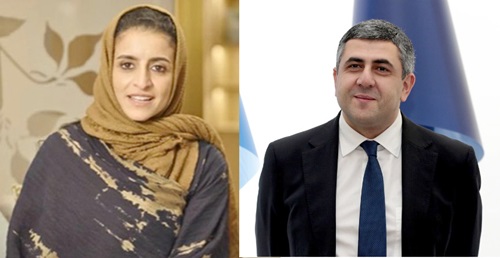September is always a special month in the world of travel and tourism.
Each year, the global community marks World Tourism Day on September 27, pausing to reflect on the significance of tourism for economies, cultures and societies.
This year, the celebration on the theme: Tourism and Sustainable Transformation, will take place in Melaka, Malaysia.
World Tourism Day is spearheaded by UN Tourism, which has issued a detailed concept note to guide this year’s observance.
The note underscores tourism’s transformative potential as a driver of positive change, while emphasising that realising this potential demands more than mere growth.
It calls for effective governance, strategic planning, responsible investment, and a deliberate focus on sustainability, resilience and inclusion.
Across the world, and especially among UN Tourism’s member states, the day will be marked with activities led by ministries of tourism, national boards and authorities, and the private sector across the value chain.
From heritage tours to sustainability workshops, and from cultural showcases to industry dialogues, World Tourism Day brings together diverse actors to reflect on progress, share innovations, and renew their commitment to a more sustainable future.
Africa hosts G20 Summit
September 2025 is especially significant because, for the first time in history, Africa will host the G20 Summit, with global leaders gathering in Johannesburg from September 22 to 23. Ahead of that milestone is another key gathering:
The G20 Tourism Ministers’ Meeting on September 12 in Mpumalanga Province, South Africa, hosted by the Minister of Tourism, Patricia de Lille.
At this meeting, ministers will finalise the G20 Action Plan for Sustainable Tourism Development, a framework built around four key priorities: AI and innovation for people, tourism financing and investment, air connectivity for seamless travel, and resilience and inclusion.
Moment for Africa
For Africa, the timing could not be more important.
The continent received less than 10 per cent of the more than 1.4 billion international tourist arrivals in 2024, and a similar share of global tourism receipts.
In the global MICE industry, Africa’s portion of the pie is even smaller, accounting for less than four per cent.
This raises a critical question: Could Africa’s role in hosting the G20 Summit and shaping its tourism agenda become a catalyst for improvement?
The opportunity is clear. Better air connectivity could unlock intra-African tourism and reduce the costs of doing business. Smarter investment, aligned with sustainability, could build the infrastructure and skills pipeline the sector needs.
Supporting SMEs and start-ups with innovation and financing can unlock inclusive growth, while resilience planning ensures that communities and destinations are better equipped to withstand shocks — from pandemics to climate change.
The symbolism of hosting the G20 Summit should not be underestimated. Africa, often seen as a destination, now becomes a driver of the global agenda. The choices made this September could reshape the continent’s place in tourism and MICE for decades to come.
World Tourism Day
These priorities align closely with the World Tourism Day agenda.
The UN Tourism concept note emphasises transformation driven by stronger governance, skills development, strategic innovation, responsible entrepreneurship, and smarter investment.
It also warns that nearly half of young people in emerging destinations lack adequate training to participate effectively in the tourism sector.
Bridging this gap is crucial, especially in Africa, where a youthful population could either be left behind or become the backbone of a thriving industry.
The note also points to investment. Between 2019 and 2024, tourism attracted more than US$126 billion in new foreign direct investment.
Imagine if even a fraction of that were directed deliberately towards Africa’s SMEs, sustainable infrastructure, and training programmes.
That would not only transform tourism but also transform lives.
Ghana’s tourism journey
Within this continental picture lies Ghana’s own journey. In 2019, the Year of Return brought hundreds of thousands of visitors from the African diaspora, reconnecting with heritage and giving a boost to the local tourism economy.
The momentum carried forward with Beyond the Return, which sought to sustain interest and diversify offerings even in the face of the pandemic.
Now, the new government is advancing the Black Star Experience, a cultural tourism agenda that seeks to leverage Ghana’s history, heritage and creativity to strengthen its place on the global tourism map. Alongside these cultural initiatives, Ghana must also strengthen its MICE credentials.
Accra has the potential to emerge as a hub for West Africa, but this will require stronger air connectivity, deliberate financing, and world-class conference infrastructure.
Likewise, Kumasi and other regional cities have an opportunity to position themselves as attractive destinations for international meetings and events.
A defining September
September 2025, then, is more than a busy month on the calendar.
It is a defining moment for Africa and for the global tourism community.
By hosting the G20 Summit and the G20 Tourism Ministers’ Meeting, Africa is not only welcoming the world but also shaping the agenda.
For once, the continent is not simply a destination to be visited, but a voice to be heard.
As the world looks to Melaka on September 27, under the leadership of UN Tourism, we should embrace the clear call to action: tourism must become a platform for systemic and sustainable transformation.
This means making deliberate choices about how we invest, how we innovate, and how we educate and empower people.
Tourism has the power to foster peace, regenerate communities, and create opportunities where they are most needed.
The time to act is now.
If Africa, and Ghana within it, seize this moment with clarity and determination, tourism can become not just a journey of places but a journey of progress, shaping a more sustainable, inclusive and resilient future for all.

